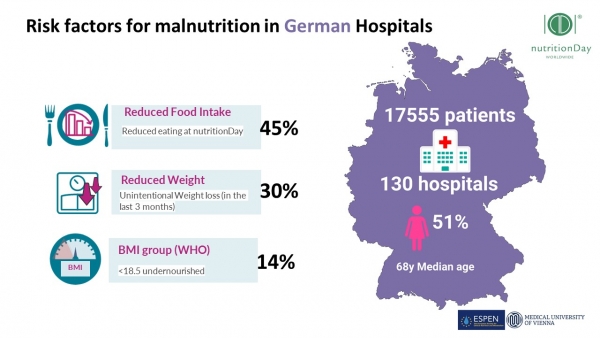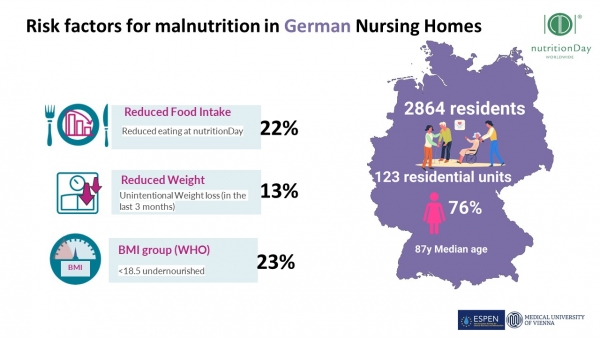Join nutritionDay in Germany!!
Join nutritionDay on 13th of November 2025!
Participation in nutritionDay is open to all hospitals, nursing homes and outpatient institutions. Participation is anonymous, independent, free of charge, requires no special expertise, and takes place on a single day.
For interested institutions, there are two online information sessions for new starters of nutritionDay:
Thursday, 25th of September 2025, at 4:30 p.m.
Please find more information here.
Data from recent years from German institutions were analysed as part of a decision support project for the 15th DGE-Nutrition Report, published by the German Nutrition Society. In addition to the evaluation of nutritionDay data referring to the nutritional situation in Germany's hospitals and nursing homes for the years 2019-2022, several online dialogues were conducted in spring 2023 to qualitatively evaluate the perspectives of those involved in nutritional care in hospitals and nursing homes. The report is available at:
15. DGE Nutrition Report
Extract from results of the 15th DGE-Nutrition Report:
“Analysis and evaluation of the nutritional situation and quality of nutritional care in hospitals and nursing homes”
Key findings from the participating nursing homes
Key findings on challenges and approaches to improving nutritional care in hospitals and nursing homes (results from online dialogues):
Challenges
-Lack of prioritization of nutritional topics
-Lack of time and high workloads
-Lack of budget and rising costs
Suggestions for improvement
-Increase and standardize the predefined amount of money intended for food
-Additional training opportunities (continuing education and training on aspects of nutritional care)
-Mandatory nutritional therapy structures and processes
-Expansion of interdisciplinary collaboration
Results on the cost-effectiveness of improved nutritional care in hospitals:
A model calculation showed potential annual cost savings of almost €1 billion through increasing the amount of food consumed induced by improved nutritional management and the associated reduction in hospital length of stay.
Based on the results above, following conclusions can be drawn:
-Malnutrition continues to be a widespread problem among German patients and nursing home residents.
-Measures to improve nutritional care in hospitals and nursing homes are urgently needed to prevent the development of malnutrition and to adequately address existing nutritional problems.
-Despite difficult framework conditions, feasible options for improving nutritional care in facilities by prioritizing nutritional issues are available.
-There is considerable potential for cost-savings through improved nutritional management.
nutritionDay as a Benchmarking Program
By participating in nutritionDay, hospital wards and nursing home units receive a comprehensive results report with important nutrition-related information. This report enables an anonymous comparison of their own data with all other participants from Germany, across Europe and around the world (benchmarking). It also provides an opportunity to discuss ideas for improving the nutritional situation and the quality of nutritional care within the institution.
Participation in nutritionDay thus promotes good nutritional care within the facility, raises awareness about nutrition and malnutrition, documents the development of the nutritional situation – especially with regular participation over the years – and fosters an active partnership between patients, nursing staff and doctors. As a result, the nutritional situation and quality of life of patients and residents can be sustainably improved.
Visit nutritionDay worldwide for more information, to register, and to download the German questionnaires for hospitals, nursing homes, intensive care units and outpatient institutions.
If you have any questions, please contact
Dr. Linda Weber
interest@nutritionday.org
+49 911 5302 96166
Further recent publications of nutritionDay data from Germany:
http://www.thieme-connect.com/products/ejournals/abstract/10.1055/s-0045-1809100
https://www.nature.com/articles/s41430-022-01129-y.pdf
https://pubmed.ncbi.nlm.nih.gov/35411028/










